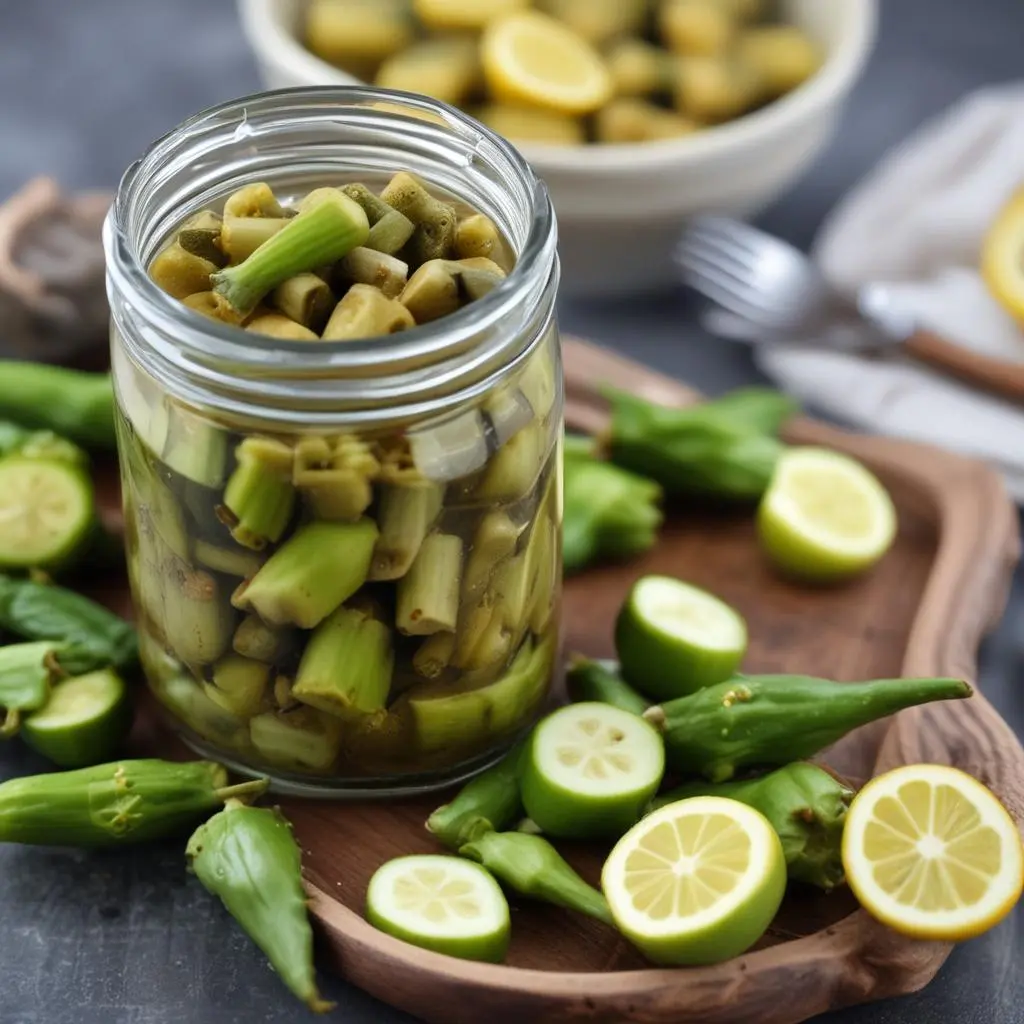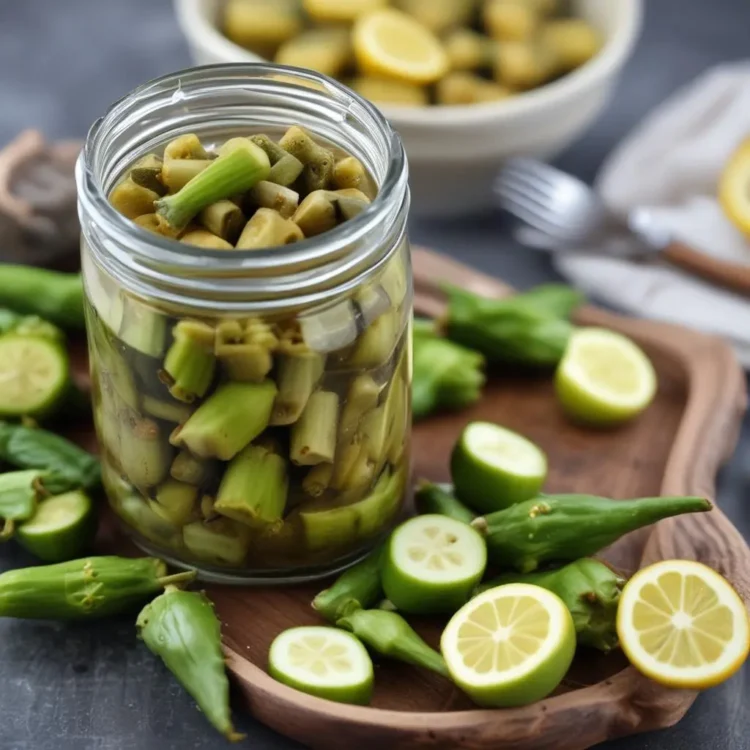
Making a flavorful pickled okra recipe with lemon, pepper, and garlic is a wonderful way to preserve the okra harvest and enjoy it year-round. This zesty recipe combines the tanginess of lemon, the heat of black pepper, and the rich aroma of garlic for a mouth-watering pickle that’s as good with a sandwich as it is on its own. With this guide, you’ll create a jar of crunchy, tangy, and spicy okra with a unique twist that balances classic pickling spices with the bright, fresh flavor of lemon and pepper.
Ingredients (Preparation Time: 10 minutes)
- 1 pound fresh okra, washed and dried
- 1 cup white vinegar
- 1 cup water
- 2 teaspoons kosher salt
- 1 tablespoon lemon zest
- 1 teaspoon black peppercorns
- 3 cloves garlic, peeled and smashed
- 1 small lemon, sliced thinly
- 2 sprigs fresh dill (optional)
- 1 teaspoon crushed red pepper flakes (optional, for added spice)
Preparing the Okra (10 minutes)
- Trim the okra: Start by trimming the stems of each okra pod without cutting into the pod itself, which helps keep the okra crispy during pickling.
- Prepare the jars: Wash and sterilize the jars you’ll use for pickling to ensure freshness.
Making the Brine (5 minutes)
- Combine the ingredients: In a small saucepan, add vinegar, water, kosher salt, and lemon zest. Heat over medium heat and stir until the salt is fully dissolved (about 5 minutes).
- Add flavors: Once the brine is hot, add the black peppercorns and garlic to the mix.
Filling the Jars (15 minutes)
- Pack the okra: Arrange the okra pods upright in the sterilized jars, adding a few slices of lemon and garlic cloves between layers for even distribution.
- Pour the brine: Carefully pour the hot brine over the okra in the jars, covering them fully. Leave a half-inch space at the top of each jar.
- Add additional seasonings (optional): Add a sprig of dill or a pinch of crushed red pepper flakes to each jar if you like an extra layer of flavor.
Sealing and Processing the Jars (5 minutes)
- Seal the jars: Wipe the rims of the jars with a clean cloth, then close tightly with lids.
- Water bath (optional for extended storage): If you’re looking to store the pickled okra for several months, process the jars in a boiling water bath for 10 minutes.
Storage and Waiting Time (1 week minimum)
- Refrigerate the jars once cooled, and allow the flavors to blend for at least a week before enjoying your pickled okra with lemon, pepper, and garlic. The longer you wait, the more the flavors will develop, enhancing the tanginess of the lemon and the aromatic garlic notes.
Tips for the Best Pickled Okra
Selecting the Freshest Okra
- Choose smaller pods: Look for okra pods that are firm and small. Smaller pods are usually less fibrous and have a better texture when pickled.
- Check for ripeness: Avoid any pods that feel soft or have spots; these are signs the okra might be past its prime.
Balancing the Flavors
- The lemon zest adds brightness without overpowering the brine. Adjust the lemon slices according to your taste—using too many can make the brine overly tart.
- Garlic brings depth, but can easily dominate, so stick to 2-3 cloves per jar unless you prefer a strong garlic flavor.
- Peppercorns and red pepper flakes add the right amount of spice and balance, creating a subtle heat that complements the citrusy notes.
Variations of Pickled Okra with Lemon, Pepper, and Garlic
Spicy Pickled Okra
- For a spicier pickled okra, add an extra teaspoon of crushed red pepper flakes to each jar or include sliced fresh jalapeños in with the okra.
- Crushed black pepper can also boost the heat, adding a touch of sharp spice.
Herb-Infused Pickled Okra
- Try adding fresh herbs like dill or thyme to the jar for an herbaceous note. Dill pairs especially well with the lemon and garlic in this recipe.
Using Different Types of Vinegar
- White vinegar is standard, but apple cider vinegar adds a mellow, fruity undertone. Keep the quantity the same but experiment to see which flavor profile you prefer.
How to Enjoy Pickled Okra with Lemon, Pepper, and Garlic
As a Snack or Side Dish
- Pickled okra with this unique blend is a flavorful, low-calorie snack. The lemon and pepper create a refreshing tang that’s perfect for munching straight out of the jar.
In Sandwiches and Wraps
- Sliced pickled okra can add a tangy crunch to sandwiches or wraps, enhancing flavors with a mix of garlic and lemon. Try it with grilled chicken, turkey, or roasted vegetable sandwiches.
As a Topping for Salads
- Chopped pickled okra adds a unique twist to salads. The zesty lemon and garlic flavor blends well with mixed greens, tomatoes, and cucumbers.
Frequently Asked Questions
Why is My Pickled Okra Slimy?
- Okra naturally contains a substance called mucilage, which can make it slimy, especially when cooked. However, pickling with lemon and vinegar helps reduce slime. Using young, smaller okra pods can also help maintain a crisp texture.
How Long Does Pickled Okra Last?
- Properly sealed pickled okra jars can last up to one year if stored in a cool, dark place. Once opened, it’s best consumed within a month and should be kept in the refrigerator.
Can I Adjust the Amount of Garlic and Pepper?
- Absolutely! Feel free to add more or less garlic or pepper depending on your preference. These ingredients give the okra its characteristic kick, but they can be adjusted to taste.
What’s the Best Type of Salt for Pickling?
- Use kosher salt or pickling salt as these are pure salts without additives that can cloud the brine. Avoid table salt since it often contains anti-caking agents that may affect the appearance and taste.
Is It Necessary to Process the Jars in a Water Bath?
- A water bath is optional if you’re making a small batch that will be stored in the fridge. For longer storage, processing the jars in a boiling water bath will ensure a safe seal and preserve freshness.
Why Add Lemon to Pickled Okra?
- Lemon adds a bright, acidic note that enhances the overall flavor profile and helps in balancing the intense garlic and pepper in the brine.

